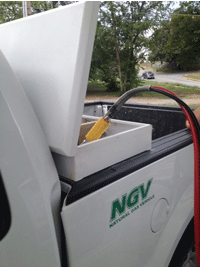Natural Gas Vehicles
 Natural gas powers about 112,000 vehicles in the United States and roughly 14.8 million vehicles worldwide. Natural gas vehicles (NGVs), which can run on compressed natural gas (CNG), are good choices for high-mileage, centrally-fueled fleets that operate within a limited area. For vehicles needing to travel long distances, liquefied natural gas (LNG) is a good choice. The advantages of natural gas as a transportation fuel include its domestic availability, widespread distribution infrastructure, low cost, and clean-burning qualities.
Natural gas powers about 112,000 vehicles in the United States and roughly 14.8 million vehicles worldwide. Natural gas vehicles (NGVs), which can run on compressed natural gas (CNG), are good choices for high-mileage, centrally-fueled fleets that operate within a limited area. For vehicles needing to travel long distances, liquefied natural gas (LNG) is a good choice. The advantages of natural gas as a transportation fuel include its domestic availability, widespread distribution infrastructure, low cost, and clean-burning qualities.
The horsepower, acceleration, and cruise speed of NGVs are comparable with those of equivalent conventional vehicles. And, compared with conventional diesel and gasoline vehicles, NGVs provide emissions and environmental benefits.
The cost of gasoline and diesel has double in the last four years and is only forecasted to go higher as the world economic condition improves. Presently, the national average for a gallon of gasoline or a gallon of diesel is 40% to 50% more than a gasoline or diesel gallon equivalent of CNG. At these current price differences and the expected sky-rocketing prices of gasoline and diesel, we believe it makes good business sense to convert to natural gas as a primary transportation fuel.
Depending on the miles per gallon and the average miles driven per year, the return for converting a vehicle to CNG operations can be realized quickly. Even though the initial investment can be expensive, a large portion of the investment (the pressurized portion) can be reused on multiple vehicles since it has a twenty year life-span. This transfer of equipment can decrease the cost of the next conversion to as low as 25% to 30% of the original conversion cost.
